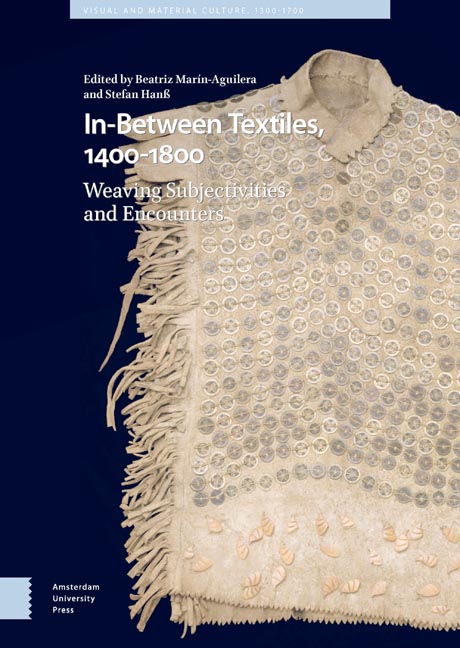Book contents
- Frontmatter
- Dedication
- Miscellaneous Frontmatter
- Table of Contents
- List of Illustrations
- Acknowledgements
- 1 Subjectivities In-Between Early Modern Global Textiles
- Part I Unhomeliness, Mimicry, and Mockery
- Part II The Material Enunciation of Difference
- Part III Identity Effects In-Between the Local and the Global
- Part IV Material Translation and Cultural Appropriation
- Archives, Libraries, and Museums (Abbreviations)
- Select Bibliography
- Index
5 - Textiles, Fashion, and Questions of Whiteness: Racial Politics and Material Culture in the British World, c.1660–1820
Published online by Cambridge University Press: 14 October 2023
- Frontmatter
- Dedication
- Miscellaneous Frontmatter
- Table of Contents
- List of Illustrations
- Acknowledgements
- 1 Subjectivities In-Between Early Modern Global Textiles
- Part I Unhomeliness, Mimicry, and Mockery
- Part II The Material Enunciation of Difference
- Part III Identity Effects In-Between the Local and the Global
- Part IV Material Translation and Cultural Appropriation
- Archives, Libraries, and Museums (Abbreviations)
- Select Bibliography
- Index
Summary
Abstract
This chapter investigates the links between textile politics and emergent race thinking, charting the material landscapes that global commerce unsettled in the British world during the long eighteenth century. Textiles absorbed, reflected, and enacted “differentiations” in this period of imperial expansion. The layered anxieties around new commodities, this chapter argues, were routinely infused with racial thinking; and the negotiation of these anxieties tracks the creation of imperial culture in the British Isles and beyond. During this period, a once foreign textile, cotton, became domesticated and fashion priorities emerged that canonised hierarchies of race.
Keywords: British colonialism; Critical Race Studies; global consumerism; identity politics; cultural anxieties
Introduction
Textile trades were foundational in early modern Europe, with imperial states working to protect and advance established cloth industries at the core of their economies and cultures. Global commerce unsettled these material landscapes and its established interregional competition, with cultural and political tensions erupting and nations jostling for ascendency. Policing the dress of residents became a pressing imperative. Apparel and its components could bolster state authority, or generate anxieties and rejoinders, while, in Britain, imperial priorities ignited new material discourse. As global trade grew, the impact of foreign subaltern goods sparked discomfort for some. Cloth and clothing, in particular, were intended to strengthen national and imperial purpose, but: “Wearing foreign clothes disrupted the way of knowing one’s country of origin and, perhaps more upsetting, where one’s loyalty lay.” Textile politics involved more than nationalist sentiment, however, with racialism figuring in response to global commodities. In the long eighteenth century, commodities acquired from global and colonial settings carried complex meanings: potential profit for the metropole, offset by perceived risks of pollution and disruption. These seeming threats differed fundamentally from the antagonism towards competing European wares, as evolving precepts around race strengthened beyond established xenophobic paradigms.
New imports were often aligned with populations of colour and figured as part of imperial agendas. For instance, over the 1600s, English authorities grappled with the perceived threat of “Indianization” through the growing use of tobacco from the Americas. The disquiet surrounding this substance stubbornly persisted through the century, even as this leaf became culturally infused with acceptable (racialised) connotations of empire.
- Type
- Chapter
- Information
- In-Between Textiles, 1400-1800Weaving Subjectivities and Encounters, pp. 115 - 138Publisher: Amsterdam University PressPrint publication year: 2023



